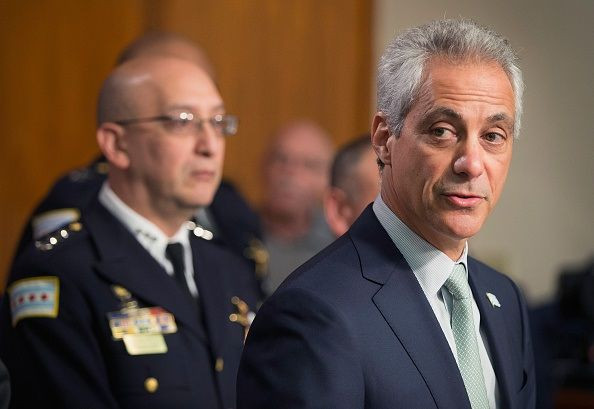Chicago Mayor Rahm Emanuel Announces More Taser Police Training After Quintonio LeGrier Shooting

Amid calls for his resignation over the city's handling of police brutality cases, Chicago Mayor Rahm Emanuel announced Wednesday a revamped set of officer training policies. Speaking at a news conference with interim Police Superintendent John Escalante, Emanuel said he would double the number of Tasers within the Chicago Police Department to 1,400 and emphasize de-escalation techniques in tense situations.
"Just because you train that you can use force doesn't mean you should," Emanuel said. "Helping officers have that distinction and the training that goes with it is essential."
Emanuel said that he wants to reform police training and the department's culture in an effort to rebuild trust between Chicago's citizens and law enforcement and to ensure safety. Going forward, officers will be taught to use more conversational — rather than confrontational — communication methods. Escalante added that he looked to units in places like New York City, Cleveland, Seattle and Portland, Oregon, in developing the new rules.
Mayor Emanuel says police changes being made so "force can be the last option, not the first choice." pic.twitter.com/vkd7lkdwhJ
— Mitch Smith (@MitchKSmith) December 30, 2015Escalante added that he reissued a policy Monday reminding officers that if a Taser and a person qualified to use it are available when a 911 call comes in, they are both required to go out. He said he also changed a rule earlier this week that puts officers involved in a shooting on desk duty for 30 days while the incident is reviewed. Before, it was three.
"Our goal is to change the way officers think when they approach an incident," Escalante said Wednesday.
Emanuel returned early from his vacation in Cuba this week after city police fatally shot Quintonio LeGrier, 19, as they responded to a 911 call from LeGrier's dad Saturday. LeGrier's father told officers his son had threatened him with a bat. Officers also accidentally killed his neighbor, Bettie Jones, 55, who opened the door for them, according to WLS.
After news of the shootings broke, Emanuel issued a statement saying in part, "it is clear changes are needed to how officers respond to mental health crises," CNN reported.
Chicago has also seen weeks of protests against Emanuel in connection with the case of Laquan McDonald, a 17-year-old fatally shot by police Oct. 20, 2014. Initial police statements on McDonald's death said the teen had threatened police with a knife, but a video released this past November appeared to show him walking away from the officers. Audio released last week indicated that an officer who responded to the call requested a Taser to use with McDonald, but instead he was shot 16 times, WMAQ reported.
A Department of Justice probe into Chicago's police department is ongoing.
© Copyright IBTimes 2024. All rights reserved.






















